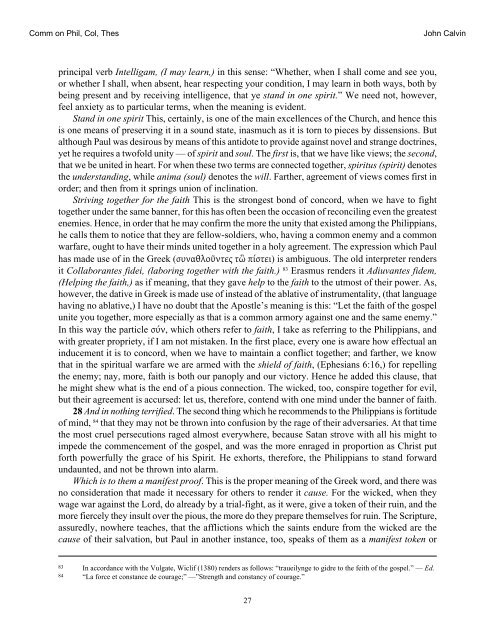Commentary on Philippians, Colossians, and Thessalonians
Commentary on Philippians, Colossians, and Thessalonians
Commentary on Philippians, Colossians, and Thessalonians
Create successful ePaper yourself
Turn your PDF publications into a flip-book with our unique Google optimized e-Paper software.
Comm <strong>on</strong> Phil, Col, Thes<br />
principal verb Intelligam, (I may learn,) in this sense: “Whether, when I shall come <strong>and</strong> see you,<br />
or whether I shall, when absent, hear respecting your c<strong>on</strong>diti<strong>on</strong>, I may learn in both ways, both by<br />
being present <strong>and</strong> by receiving intelligence, that ye st<strong>and</strong> in <strong>on</strong>e spirit.” We need not, however,<br />
feel anxiety as to particular terms, when the meaning is evident.<br />
St<strong>and</strong> in <strong>on</strong>e spirit This, certainly, is <strong>on</strong>e of the main excellences of the Church, <strong>and</strong> hence this<br />
is <strong>on</strong>e means of preserving it in a sound state, inasmuch as it is torn to pieces by dissensi<strong>on</strong>s. But<br />
although Paul was desirous by means of this antidote to provide against novel <strong>and</strong> strange doctrines,<br />
yet he requires a twofold unity — of spirit <strong>and</strong> soul. The first is, that we have like views; the sec<strong>on</strong>d,<br />
that we be united in heart. For when these two terms are c<strong>on</strong>nected together, spiritus (spirit) denotes<br />
the underst<strong>and</strong>ing, while anima (soul) denotes the will. Farther, agreement of views comes first in<br />
order; <strong>and</strong> then from it springs uni<strong>on</strong> of inclinati<strong>on</strong>.<br />
Striving together for the faith This is the str<strong>on</strong>gest b<strong>on</strong>d of c<strong>on</strong>cord, when we have to fight<br />
together under the same banner, for this has often been the occasi<strong>on</strong> of rec<strong>on</strong>ciling even the greatest<br />
enemies. Hence, in order that he may c<strong>on</strong>firm the more the unity that existed am<strong>on</strong>g the <strong>Philippians</strong>,<br />
he calls them to notice that they are fellow-soldiers, who, having a comm<strong>on</strong> enemy <strong>and</strong> a comm<strong>on</strong><br />
warfare, ought to have their minds united together in a holy agreement. The expressi<strong>on</strong> which Paul<br />
has made use of in the Greek (συναθλοῦντες τὣ πίστει) is ambiguous. The old interpreter renders<br />
it Collaborantes fidei, (laboring together with the faith.) 83 Erasmus renders it Adiuvantes fidem,<br />
(Helping the faith,) as if meaning, that they gave help to the faith to the utmost of their power. As,<br />
however, the dative in Greek is made use of instead of the ablative of instrumentality, (that language<br />
having no ablative,) I have no doubt that the Apostle’s meaning is this: “Let the faith of the gospel<br />
unite you together, more especially as that is a comm<strong>on</strong> armory against <strong>on</strong>e <strong>and</strong> the same enemy.”<br />
In this way the particle σύν, which others refer to faith, I take as referring to the <strong>Philippians</strong>, <strong>and</strong><br />
with greater propriety, if I am not mistaken. In the first place, every <strong>on</strong>e is aware how effectual an<br />
inducement it is to c<strong>on</strong>cord, when we have to maintain a c<strong>on</strong>flict together; <strong>and</strong> farther, we know<br />
that in the spiritual warfare we are armed with the shield of faith, (Ephesians 6:16,) for repelling<br />
the enemy; nay, more, faith is both our panoply <strong>and</strong> our victory. Hence he added this clause, that<br />
he might shew what is the end of a pious c<strong>on</strong>necti<strong>on</strong>. The wicked, too, c<strong>on</strong>spire together for evil,<br />
but their agreement is accursed: let us, therefore, c<strong>on</strong>tend with <strong>on</strong>e mind under the banner of faith.<br />
28 And in nothing terrified. The sec<strong>on</strong>d thing which he recommends to the <strong>Philippians</strong> is fortitude<br />
of mind, 84 that they may not be thrown into c<strong>on</strong>fusi<strong>on</strong> by the rage of their adversaries. At that time<br />
the most cruel persecuti<strong>on</strong>s raged almost everywhere, because Satan strove with all his might to<br />
impede the commencement of the gospel, <strong>and</strong> was the more enraged in proporti<strong>on</strong> as Christ put<br />
forth powerfully the grace of his Spirit. He exhorts, therefore, the <strong>Philippians</strong> to st<strong>and</strong> forward<br />
undaunted, <strong>and</strong> not be thrown into alarm.<br />
Which is to them a manifest proof. This is the proper meaning of the Greek word, <strong>and</strong> there was<br />
no c<strong>on</strong>siderati<strong>on</strong> that made it necessary for others to render it cause. For the wicked, when they<br />
wage war against the Lord, do already by a trial-fight, as it were, give a token of their ruin, <strong>and</strong> the<br />
more fiercely they insult over the pious, the more do they prepare themselves for ruin. The Scripture,<br />
assuredly, nowhere teaches, that the afflicti<strong>on</strong>s which the saints endure from the wicked are the<br />
cause of their salvati<strong>on</strong>, but Paul in another instance, too, speaks of them as a manifest token or<br />
83 In accordance with the Vulgate, Wiclif (1380) renders as follows: “traueilynge to gidre to the feith of the gospel.” — Ed.<br />
84 “La force et c<strong>on</strong>stance de courage;” —”Strength <strong>and</strong> c<strong>on</strong>stancy of courage.”<br />
27<br />
John Calvin















